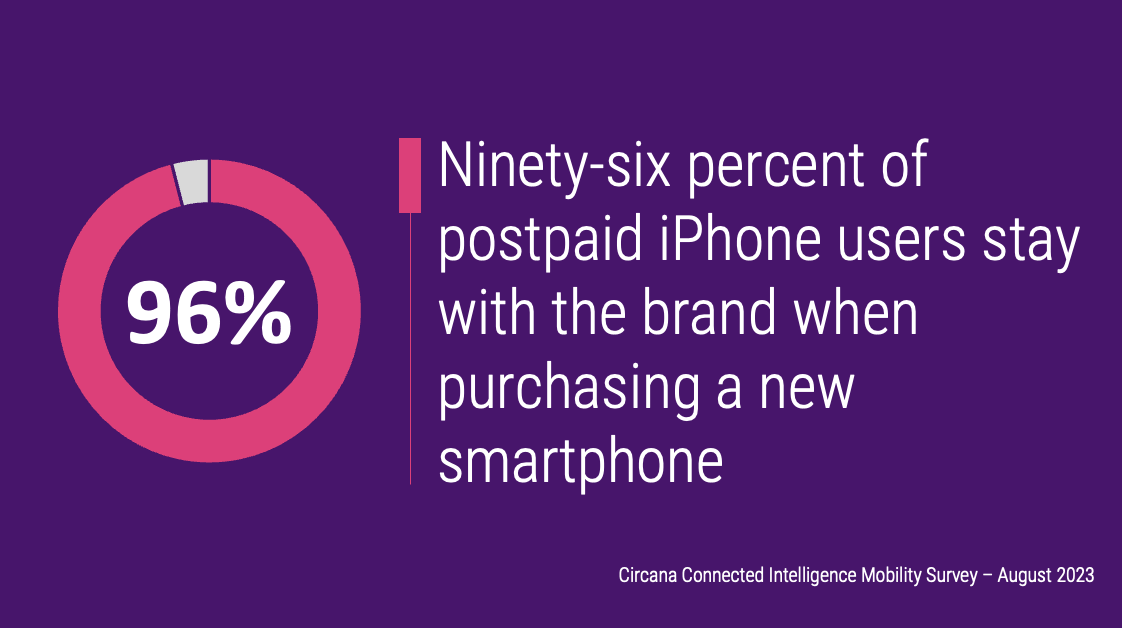
Apple drops its guard on RCS messaging
Google, the founder of Android, had long been pushing Apple to support RCS for richer communication interoperability between iPhone and Android smartphones, and Apple has finally agreed. The company last week announced that it will be adding support for RCS next year to offer a better interoperability experience when compared to SMS or MMS. Apple also noted that the supported new system will work alongside iMessage.
The Circana Take:
- Apple joining the RCS platform might have initially created a lot of excitement on the Android front, but Apple made it very clear that the new platform will work “alongside” iMessage, which has been a major churn factor for Android. According to Circana’s latest Connected Intelligence Mobility survey, 29% of ex-Android users who switched to iPhone did so for Apple’s exclusive iMessage and Facetime apps. But more importantly, 43% of them noted that they preferred iPhone over Android because their friends and family members are using an iPhone. And once they are in, it is very rare that they switch back. As the Circana Mobile Consumer Tracking database shows, 96% of postpaid iPhone users stay with the brand when purchasing a new smartphone.
- As noted, the new RCS support will be offered alongside iMessage, meaning the blue bubble FOMO of Android users, especially those in grade schools, will still be there. Apple has a commanding lead in market share in the under-18 age segment, which is truly the main segment having social concerns about the blue vs. green SMS bubble phenomena, and Apple should have little worry for churn due to its upcoming RCS support.
- We recently saw the emerging Android brand Nothing implementing custom iMessage-compatible messaging apps prior to Apple’s RCS announcement, but the company quickly pulled the beta app from Google Play store due to privacy concerns. It should be remembered that all of Apple’s communication apps (like iMessage) have end-to-end encryption, which is something that will not be available via the RCS support. Apple has built such an enormous equity around its privacy supremacy (what happens on your iPhone stays on your iPhone) that we do not expect the RCS support to make any material impact on Apple’s share of the smartphone market.
- Apple’s RCS support will provide greater interoperability between iOS and Android users, but at the end of the day, it is just semantics. Popular over-the-top communication applications such as WhatsApp already provide this support in addition to video calling. There are many global regions where iPhone users rely on WhatsApp much more than the iMessage platform when communicating with other iPhone and/or Android users. Even in the US, close to a third of iPhone users regularly use WhatsApp, and more than half use it more frequently than they use iMessage to communicate with their social circle.
- Apple’s tactical playbook on the RCS support is the same one it used with other consumer rights related sustainability/compatibility issues. Apple’s decision to switch from the lightning connector to USB-C on the latest iPhones is a result of the regulatory push from the European Union, and it was likely to face a similar enforcement on the RCS side. Apple also recently changed its stance on California’s right-to-repair bill after years of reluctance in supporting it as it gives consumers the ability to prolong the life of their phones rather than replacing it with a new one. It is true that Apple’s global iPhone upgrade numbers are declining as consumer hold on to their smartphones more than ever, but the company has found a way of generating recurring service revenues from this overly loyal user base.